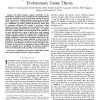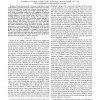9 search results - page 1 / 2 » Paradox of Shortest Path Routing for Large Multi-Hop Wireles... |
INFOCOM
2007
IEEE
13 years 11 months ago
2007
IEEE
— In this paper, we analyze the impact of straight line routing in large homogeneous multi-hop wireless networks. We estimate the nodal load, which is defined as the number of p...
JSAC
2008
13 years 4 months ago
2008
The high frequency segment (10-66GHz) of the IEEE 802.16 standard seems promising for the implementation of wireless backhaul networks carrying large volumes of Internet traffic. I...
TWC
2011
12 years 11 months ago
2011
Abstract—In this paper we consider wireless cooperative multihop networks, where nodes that have decoded the message at the previous hop cooperate in the transmission toward the ...
AAAI
2000
13 years 6 months ago
2000
We consider the use of multi-agent systems to control network routing. Conventional approaches to this task are based on Ideal Shortest Path routing Algorithm (ISPA), under which ...
WCNC
2010
IEEE
13 years 8 months ago
2010
IEEE
—When shortest path routing is employed in large scale multi-hop wireless networks, nodes located near the center of the network have to perform disproportional amount of relayin...


